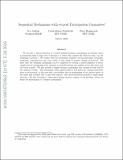Sequential Mechanisms with Ex-post Participation Guarantees
Author(s)
Ashlagi, Itai; Daskalakis, Konstantinos; Haghpanah Jahromi, Nima
DownloadSequential mechanisms.pdf (345.6Kb)
OPEN_ACCESS_POLICY
Open Access Policy
Creative Commons Attribution-Noncommercial-Share Alike
Terms of use
Metadata
Show full item recordAbstract
How should one sell an item to a buyer whose value for the item will only be realized next week? E.g. consider selling a flight to some executive who may or may not have a meeting with a client next week. Suppose that both the seller and the buyer only know a distribution, F, from which the buyer's value, v, for the item will be drawn. One way the seller could go about this sale is to make a take-it-or-leave-it offer today. The offer reads "pay the expected value today to get the item next week". A risk-neutral buyer would find this offer attractive, hence the seller would extract the full surplus. The unsettling feature of the afore-described mechanism is that, for some realizations of v, the bidder ends up with negative utility. In particular, while our mechanism is interim Individually Rational (IR), it is not ex-post IR. How could we fix this? One way is to wait until next week when the value is realized and make a take-it-or-leave-it offer of the item at an optimal monopoly price. The new mechanism is clearly ex-post IR, but its revenue could be much smaller than that of the previous one. Still, this trivial mechanism extracts the best possible revenue among all ex-post IR mechanisms, as a simple argument can establish. However, this optimality argument fails when several items are to be sold over consecutive periods. In this paper, we provide a characterization of the revenue-optimal, ex-post IR, dynamic mechanism selling k items over k periods to a bidder whose values are independent. In particular, we optimize the seller's revenue subject to the following strong individual rationality condition: at each period, the stage utility of the agent, defined to be the surplus from that period's allocation minus the agent's payment, must be non-negative. In particular, the non-negativity of the stage utilities implies that, at the end of each period, the agent's realized utility from participating in the mechanism so far is non-negative. We provide extensions to multiple bidders and an infinite horizon with discount factors.
Date issued
2016-07Department
Massachusetts Institute of Technology. Computer Science and Artificial Intelligence Laboratory; Massachusetts Institute of Technology. Department of Electrical Engineering and Computer ScienceJournal
Proceedings of the 2016 ACM Conference on Economics and Computation - EC '16
Publisher
Association for Computing Machinery
Citation
Ashlagi, Itai, Constantinos Daskalakis, and Nima Haghpanah. “Sequential Mechanisms with Ex-Post Participation Guarantees.” Proceedings of the 2016 ACM Conference on Economics and Computation - EC ’16 (2016).
Version: Original manuscript
ISBN
9781450339360